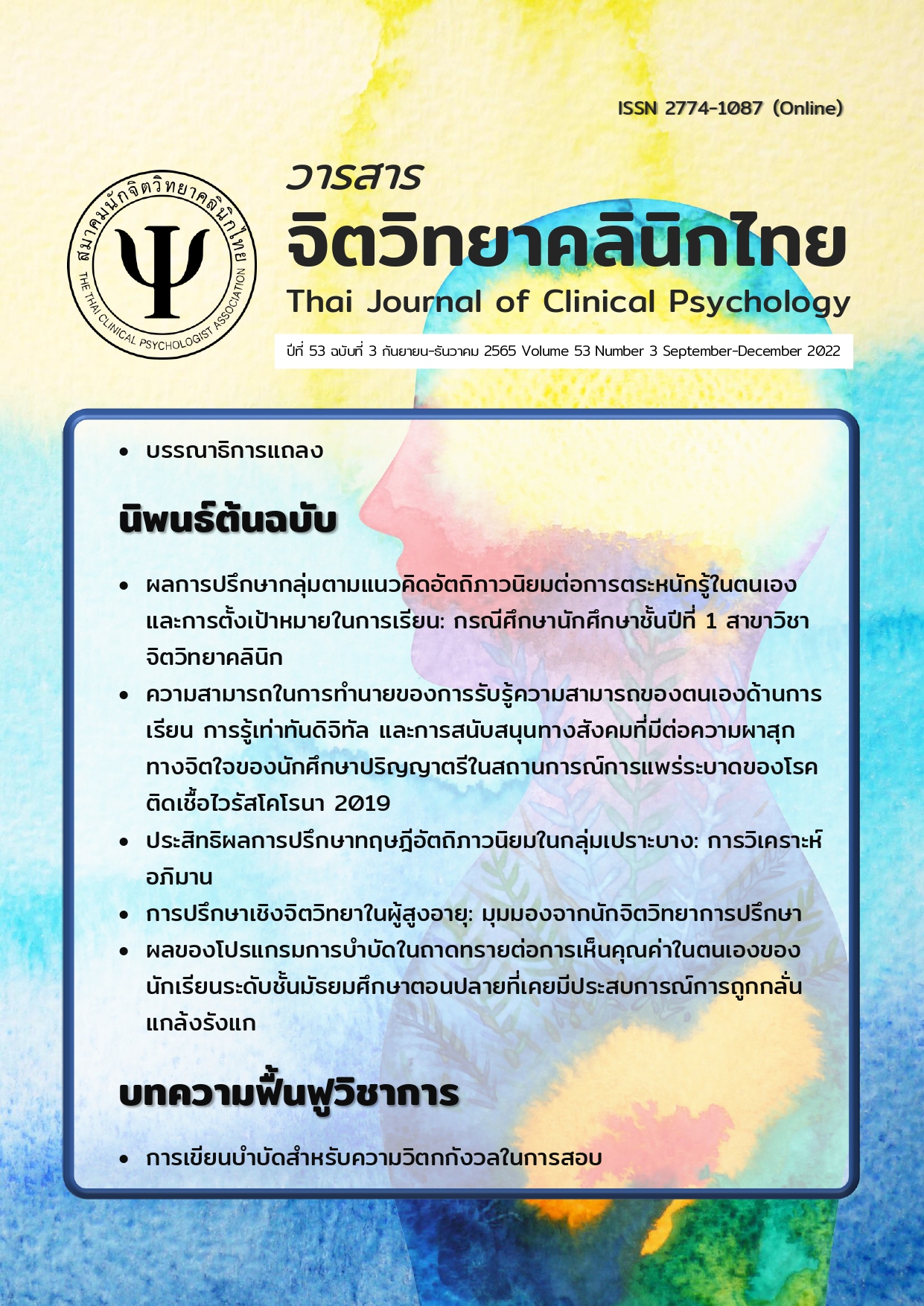Predictability of Academic Self-efficacy, Digital Literacy and Social Support on Psychological Well-Being of Undergraduate Students in the Situation of the Coronavirus Disease Epidemic (COVID-19)
Main Article Content
Abstract
Objective: The objective of this study was to study predictability of academic self-efficacy digital literacy and social support on psychological well-being of undergraduate students in the situation of the Coronavirus disease epidemic (COVID-19). Materials and methods: The sample group were a bachelor's degree students in year 1-4 in the first semester of the academic year 2021, selected by convenience sampling which has a total sample of 150 students. The data collected by online questionnaire using Academic self-efficacy scale, Social support scale, and Psychology well-being scale. All of these scales had the internal consistencies between 0.85-0.96. The statistics used to analyze the data were frequency, mean, percentage, standard deviation and multiple regression analysis using enter method. Results: The results showed that Academic self-efficacy, Digital literacy, and Social support were accounted for 40.6% of the variance of Psychological well-being in the situation of the COVID-19 epidemic (R2= .41). Digital literacy was the best predictor of psychological well-being (β = .29, p < .05) followed by social support (β = .24, p < .05) and academic self-efficacy (β = .24, p < .05). Conclusion: Academic self-efficacy, Digital literacy and Social support can predict the Psychology well-being of university students. Digital literacy is importance skill that can promote. Therefore, the universities should consider promoting such skills to students, especially during the online learning periods.
Article Details

This work is licensed under a Creative Commons Attribution-NonCommercial-NoDerivatives 4.0 International License.
เรื่องที่ลงตีพิมพ์ในวารสารจิตวิทยาคลินิกแล้วถือเป็นลิขสิทธิ์การเผยแพร่โดยวารสารจิตวิทยาคลินิกแต่เพียงผู้เดียว การตีพิมพ์หรือเผยแพร่ซ้ำในที่อื่นต้องได้รับอนุญาตจากกองบรรณาธิการวารสารฯ
References
Al-Kumaim, N. H., Alhazmi, M. K., Mohammed, F., & Gazem, N. A. (2021). Exploring the impact of the COVID-19 pandemic on university students’ learning life: An integrated conceptual motivational model for sustainable and healthy online learning. Sustainability 2021, 13, 1-20.
Anunthavorasakul, A. (2021). Open the door to education learn and fight the crisis (COVID-19). Aksorn. https://www.aksorn.com/learningviaonline (in Thai).
Chiang Mai University. (2021). Announcement of CMU, guidelines for teaching and examination management semester 1, academic year 2021 in the COVID-19 pandemic situation. https://cmu.ac.th/th/article/6e4756bd-6c69-414f-8f2b-7f1ae1b463be. (in Thai).
Department of Disaster Prevention and Mitigation. (2016). Basic concepts of disasters. http://www.dsdw2016.dsdw.go.th/doc_pr/ndc_2559-2560/PDF/wpa_8115/%E0%B8%9A%E0%B8%97%E0%B8%97%E0%B8%B5%E0%B9%88%202.pdf. (in Thai).
Department of Disease Control of Thailand. (2021). Coronavirus disease 2019 infection (COVID-19). https://ddc.moph.go.th/viralpneumonia/index.php. (in Thai).
Dulapiradit, A. (2004). Adversity, academic self-efficacy, andstudy habits of university students with different levels of academic achievement [Master’s thesis, Chulalongkorn University]. http://www.thaithesis.org/detail.php?id=1082547000642. (in Thai).
Hair, J. F., Black, B., Babin, B. J., Anderson, R. E., & Tatham, R. L. (2006). Multivariate data analysis (6th ed.). Prentice-Hall International.
Kapanya, K., Jomtan, N., & Chaimongkol, W. (2019). Development of the psychological measure. Chiang Mai University. (in Thai).
Kenan Foundation Asia. (2020). COVID-19 epidemic make an impact on thai education in 3 important ways. https://www.kenan-asia.org/th/covid-19-education-impact/. (in Thai).
Khamsombat, K. (2019). Information literacy and perceive self-efficacy of student rajabhat university northeast [Master’s thesis, Rajabhat Maha Sarakham University]. http://202.29.22.172/fulltext/2553/104010/. (in Thai).
Komcharoen, P. & Polnigongit, W. (2018). Children and digital literacy. The Journal of Social Communication Innovation, 12(2), 22-31. (in Thai).
Manochanpen, N. (2021, November 19). COVID-19 situation around the world. The Standard. https://thestandard.co/coronavirus191164/. (in Thai).
Metheekul, P. (2018). Development program for digital literacy and digital media utilization behavior for instruction of preservice teachers in the twenty-first century [Master’s thesis, Srinakharinwirot University. http://bsris.swu.ac.th/thesis/55199120021RB8992555f.pdf. (in Thai).
Mheidly, N., Fares, M. Y., & Fares, J. (2020). Coping with stress and burnout associated with telecommunication and online learning. Front. Public Health,11, 1-7. https://doi.org/10.3389/fpubh.2020.574969
Naksuwan, N. (2021). Social media literacy of thai students in digital age. Dusit Thani College Journal, 15(1), 490-502. (in Thai).
Panyasawatsut, C. (2020, August 20). COVID-19 aggravates the disparity of poor students to 300,000. True id. https://news.trueid.net/detail/nE1P8gj761mQ. (in Thai).
Patchaipoon, N., & Arin, N. (2021). Smartphone usage behavior and stress in Chiang Mai University students. Thai Journal of Clinical Psychology, 52(1), 1-15. (in Thai).
Pissamorn, C. (2019). The factors associated with the mental health of undergraduate students in private universities in Bangkok [Master’s thesis, Bangkokthunburi University] https://bkkthon.ac.th/home/user_files/department/department-24/files/2563/63_5.pdf. (in Thai).
Piyaphotchanakorn, S. (2015). Self-efficacy, job demands-job resources, perception of organizational justice and burnout of teachers in a private school, Samut Prakan Province with perception of organizational justice as a moderating variable [Master’s thesis, Thammasat University]. http://digital.library.tu.ac.th/tu_dc/frontend/Info/item/dc:91615. (in Thai).
Rattanapisit, C., & Leesattrupai, C. (2015). Effects of kalayana dialogue, prejudice, and life skills on psychological well-being of undergraduate students in Bangkok. MANUTSAT PARITAT: Journal of Humanities, 37(2), 47-66. (in Thai).
Sapartsorn, S. & Yamwong, P. (2019). Social support and self-efficacy in education related to the psychological well-being of students Valaya Alongkorn Rajabhat University Royal patronage. Thailand national conference on psychology 2019: Psychology with dynamic of global society: Bankok, Thailand. (in Thai).
Thaipublica (2021, January 4). Explore the impact after COVID-19 The turning point of world education. Thaipublica. https://thaipublica.org/2021/01/exploring-the-effects-of-covid-19-the-turning-point-of-world-education/. (in Thai).
Urwongse, K. & Khaninphasut, P. (2020). Research design and selection of statistics for quantitative data analysis in communications. 1-10. Sukhothai Thammathirat Open University. (in Thai).
Wongkitrungruang, W. (2018). Digital citizenship. The One-O-One Percent Co., Ltd. (in Thai).
Yamwong, P. (2012). A study of social support affect life satisfaction among Thammasat University students [Master’s thesis, Srinakarinwirot University]. https://ir.swu.ac.th/jspui/handle/123456789/3622. (in Thai).


